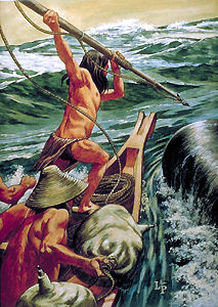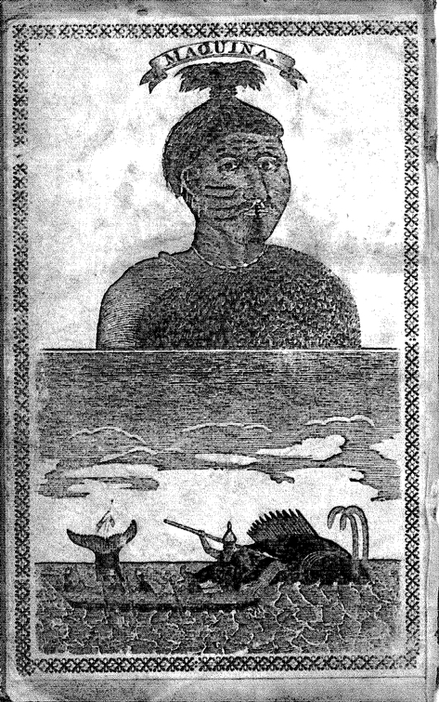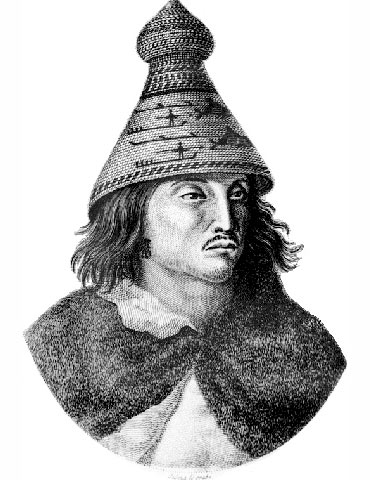 Once the Boston had set anchor, it wasn't long before the first group of Indians paddled out to the ship, led by their highest ranking member, Maquinna. The name meant "moon" and it was one of two ceremonial names held by the chief, the other being tsaxhw'sip, meaning "harpooner." Both of these names indicated his power and status among his peers. In Nootka culture, the moon symbolized the most powerful of beings, the bestowers of good luck and plentiful food; and as for harpooners -- only chiefs were harpooners, those who took on the challenging and dangerous hunt for the whale -- a noble and sacred calling. The whale was at once an intimidating quarry and a significant source of food and other necessities for the Nootka people. The Northwest Coast Indians had a very structured hierarchical society based mainly on material wealth. In that, they had quite a bit in common with their English and American visitors. In recent years, the trade in sea otter pelts had intensified to the point where enterprising Indian traders were smart enough to organize the hunting, skinning, and preparing of the pelts in such a way as to increase efficiency of production. They also cleverly organized and controlled the pricing in order to obtain the highest prices possible -- not unlike a modern day oil cartel. Maquinna was among the successful Indian merchant traders who had become not only wealthy but also savvy in the ways of the white man, learning some English and generally thriving on the power and prestige of mingling with these exotic international foreigners. This is how John R. describes Maquinna:  I was particularly struck with the looks of their king who was a man of a dignified aspect, about six feet in height and extremely strait and well proportioned. His face was rendered remarkable by a large Roman nose, a very uncommon feature among these people. His complexion was of a dark copper hue, though his face, legs, and arms were on this occasion so covered with red paint, that their natural colour could scarcely be perceived. His eye-brows were painted black in two broad stripes like a new moon, and his long black hair, which shone with oil, was fastened in a bunch on the top of his head and powdered all over with white down,* which gave him a most curious and extaordinary appearance. He was dressed in a large mantle or cloak of the black sea otter skin, which reached to his knees, and was fastened around his middle by a broad belt of the cloth of the country,* wrought, or painted with figures of several colours. This dress was by no means unbecoming, but on the contrary had an air of savage magnificence. *The white down was most likely that of a young eagle. The eagle symbolized friendship and good will, and the display of its feathers was part of the unspoken message that meant 'welcome' in all the Northwest Coast cultures. The cloth of the country was cedar bark, which could be processed in such a way that the fibrous wood made a flexible yet durable fabric. Maquinna and Captain Salter sat down to do business over a flask of rum and a simple meal of hardtack dipped in molasses -- apparently a favorite of the Indians. With their close aides (or soldiers) near at hand, it could easily be mistaken for a scene out of "The Godfather." The two could become profitable business associates or just as easily, mortal enemies. And like any delicate high stakes encounter between two very different people, the nature of the results could be triggered instantly by the smallest miscommunication... or inadvertent insult.
0 Comments
|
Archives
July 2018
Links to Related Sites Lincolnshire Wildlife Trust Rod Collins - Lincolnshire Thro' History, Life, Lens and Words The Old Palace Lincoln - Elegant Bed and Breakfast National Portrait Gallery - London College of Arms The Jewett Family of America History and Geneaology of the Jewitts of America Jowett Variations Marvinas Bay Lodge First Peoples of Canada |
Jewitt-Pennock-Foster and Cool-VanPelt Family History Copyright © 2015

 RSS Feed
RSS Feed